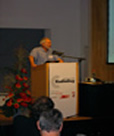
| All Things Digital |
 |
followthemedia.com - a knowledge base for media professionals |
|
|
AGENDA
|
||
Swiss Advance Digital Debate“I listen to the radio everyday,” said Swiss International Airlines CEO Christoph Franz opening his keynote address to broadcasters at Swiss RadioDay.The annual event organized jointly by public and private broadcasters drew 350 radio broadcasters to the Zürich World Trade Center at the end of August. The focus was similar - both in tone and caution - to debates among otehr European radio broadcasters. Digital media and radio’s capacities within it drew significant and lively encounters among public and private broadcasters and the Swiss regulator. Mixed with the digital issues was the continuing, though this year less contentious debate over the role and funding of the public broadcaster.  "Digital development in Switzerland is different..." Pietro Ribi/Swiss Satellite Radio Swiss Satellite Radio director Pietro Ribi (pictured) presented background on digital radio development in Switzerland and Europe. Noting that digital broadcasting in Switzerland is “different from that in the UK” Ribi explained the offerings and plans of public broadcaster SSR-SRG. Earlier in the summer sales-house RadioTele, private broadcaster Tamedia and SSR-SRG formed a consortium promoting DAB. But any further agreement between public and private broadcasters on digital strategies may be limited as the discussion has grown “very hot,” noted private broadcaster association Verband Schweizer Privatradios (VSP) president Günter Heuberger. Private broadcasters were clearly uncomfortable assuming DAB as the future of digital radio. “Italy, France and Germany are looking at other systems” Heuberger reminded the broadcasters. Radio Lac technical manager Maurice Felix raised other concerns. First on his list was the “economic problem” faced by private broadcasters in launching digital networks, a view echoed by Heuberger. SSR-SRG currently holds a monopoly on digital radio multiplexes and private broadcasters have asked the Swiss Federal Council for financial assistance. Felix also raised regulation questions about the usefulness of the current zones of concession (license) with particular concerns about broadcasts from neighboring France. Radio Lac is licensed to Geneva, surrounded on three sides by France.
Swiss regulator Bundesamt für Kommunikation (BAKOM) new projects director René Wehrlin offered that a study was underway to evaluate the new digital radio technologies. At the same time he recognized the complexity, offering rhetorically, “How can we continue talking about DAB with newer technologies coming on line?” BAKOM director Martin Dummemuth, in earlier remarks, said he is “not certain that digital means DAB. There are many technical choices and more will be developed.” Dummermuth has been BAKOM’s director for one year and has been guiding the new Swiss law on radio and television through Parliament. As he explained the progress he said many issues remain difficult to resolve, including license fee splitting between SSR-SRG and local stations, transparency in ownership, news production and advertising and frequency allocations. “Frequencies are a resource,” he established. “Mobile phone companies will pay enormous fees.” Another lively debate centered on the question “What do audiences really want?” Again the discussion turned lively as the broadcaster-panelists demurred from conclusions offered by the main presenter, Jens Wolling, professor of mass communications at Ludwig Maxmilans Universität in Munich, Germany. Offering research conducted in Germany, Dr. Wolling said radio audiences prefer closeness (locality) to distance, tension over harmony. Wolling’s research also confounded industry terminology for music genres suggesting that punk/grunge, current hits and German schlager music sufficiently define radio listeners music preferences. A panel of radio practitioners, consultants and programmers, disputed virtually every conclusion, defending niche music formats but also questioning the ability of survey research to “know” what listeners like. In his presentation “Radio The Intimate Medium” former RTL Television managing director Helmut Thoma appealed to all broadcasters to “do well” for their audiences. And for that there was no disagreement. The annual Radio of the Year awards brought one surprise. An award is presented each year to stations showing the greatest audience share increase year to year; one for stations in the Swiss-German speaking region and another for the French and Italian zones. The English language Geneva station WRG FM took home the prize for its 32% audience increase, the highest of any Swiss station. For the Swiss-German region Bern station BE1 earned the honor with a 13% audience increase. Previously published in Radio World International, January 2006, in a slightly different form. |
| copyright ©2004-2006 ftm partners, unless otherwise noted | Contact Us • Sponsor ftm |